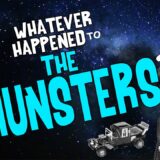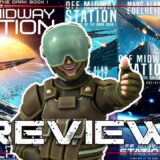Some of us older folks in Fandom grew up doing some odd things.
Often included among a list of such things is “reading the Dictionary, the Encyclopedia (Brittanica, of course) cover to cover”.
I was one such nerd.
We did it for all kinds of reasons, neurodivergence, reading obsessions, being intrigued by the endless flow of previously unknown information (and some of my compatriots will understand – better than reading matchbook covers or shampoo bottles).
We didn’t have an Internet, only the library. On rainy and inclement days there was little to do if you didn’t feel like watching one of three channels on the TV.
That’s the set up for this latest display of obsession.
Way back in the day I attempted to obtain a copy of Tuck’s two volume Encyclopedia of Science Fiction and Fantasy, but I never managed to put dollars and availability together.
Years of lament went by until I discovered the online descendant of that effort – The Encyclopedia of Science Fiction.
I now intend to read through it entry by entry, in order or presentation, and will share interesting and obscure entries I find along the way, in a series of irregularly scheduled posts.
Many thanks to John Clute, David Langford, Graham Sleight, and the late Peter Nicholls acknowledged as Founding Editor. As well as Contributing Editors who have shaped important sections of the Encyclopedia and continue to do so are Jonathan Clements, Mathew Downward and Steven Pearce; Roger Robinson. (The preceding partially borrowed from the online edition’s introduction.)
There’s some really good historical info included in the introductions to previous editions, which you can find here: 1st edition 2nd edition CD-Rom edition
I’m going to start with “A’, as opposed to the numerics, as most of those (though not all) tend to be titles of books and films. Fittingly, the first entry we consider is “A-“.
I suspect some of you will immediately be thinking of A. E. van Vogt, but don’t. This entry is not that.
We are informed that this is also sometimes displayed as “A”.
This turns out to have been a pseudonym for artist Josh Kirby, used for works published in Authentic Science Fiction magazine, a 1950s era British science fiction magazine originally titled Science Fiction Series, that title variously changed to Forthnightly and Monthly and ended up as plain old Authentic Science Fiction over the course of the magazine’s six year run.
I’m personally familiar with Authentic Science Fiction as I’ve acquired its first issue for my Volume 1 Number 1 collection, (not a Kirby cover) and because the numerous title changes have made it difficult to obtain all of the issues that should be represented in that collection.
The “fortnightly” was appropriate, as the magazine published two issues a month for the first three months of its existence. These were originally published in paperback format, though the magazine soon changed to digest size.
Here’s his covers for Authentic – he would create much more art, both covers and interiors, for numerous magazines and publishers. You can find much of his art on a commemorative website (Ronald Josh Kirby 1928 – 2001) here.
Authentic Science Fiction was published by Hamilton & Company of London, and was edited by L. G. Holmes, H. J. Campbell and E. C. Tubb, people I am sure we will become more familiar with as their letters roll around.
I think it safe to say that if you really want to learn about Science Fiction, you need to spend some time over there…maybe even read it “cover to cover” on a rainy day.

















